Research Project: Coupon Impact on JTA Supermarket Customers
VerifiedAdded on 2023/01/06
|40
|12623
|55
Report
AI Summary
This report, a research project for the BA605 course, investigates the impact of coupons on the buying behavior of customers at JTA Supermarkets. The introduction defines consumer behavior and highlights the significance of coupons as a promotional tool. The research identifies the research question, "What is the impact of coupons over the buying behaviour of customers at supermarket?" and outlines the social research process, including problem formulation, literature review, hypothesis formulation, research design, sampling, data collection, data analysis, hypothesis testing, generalization, and reporting. The study employs an experimental research design, acknowledging its limitations such as subjectivity and potential for human error. It also discusses the criteria for reliability and validity in data measurement, emphasizing the use of questionnaires. The report explores the relationship between research philosophy (positivism) and methodology, providing a comprehensive overview of the research process and its implications for understanding consumer behavior and marketing strategies.
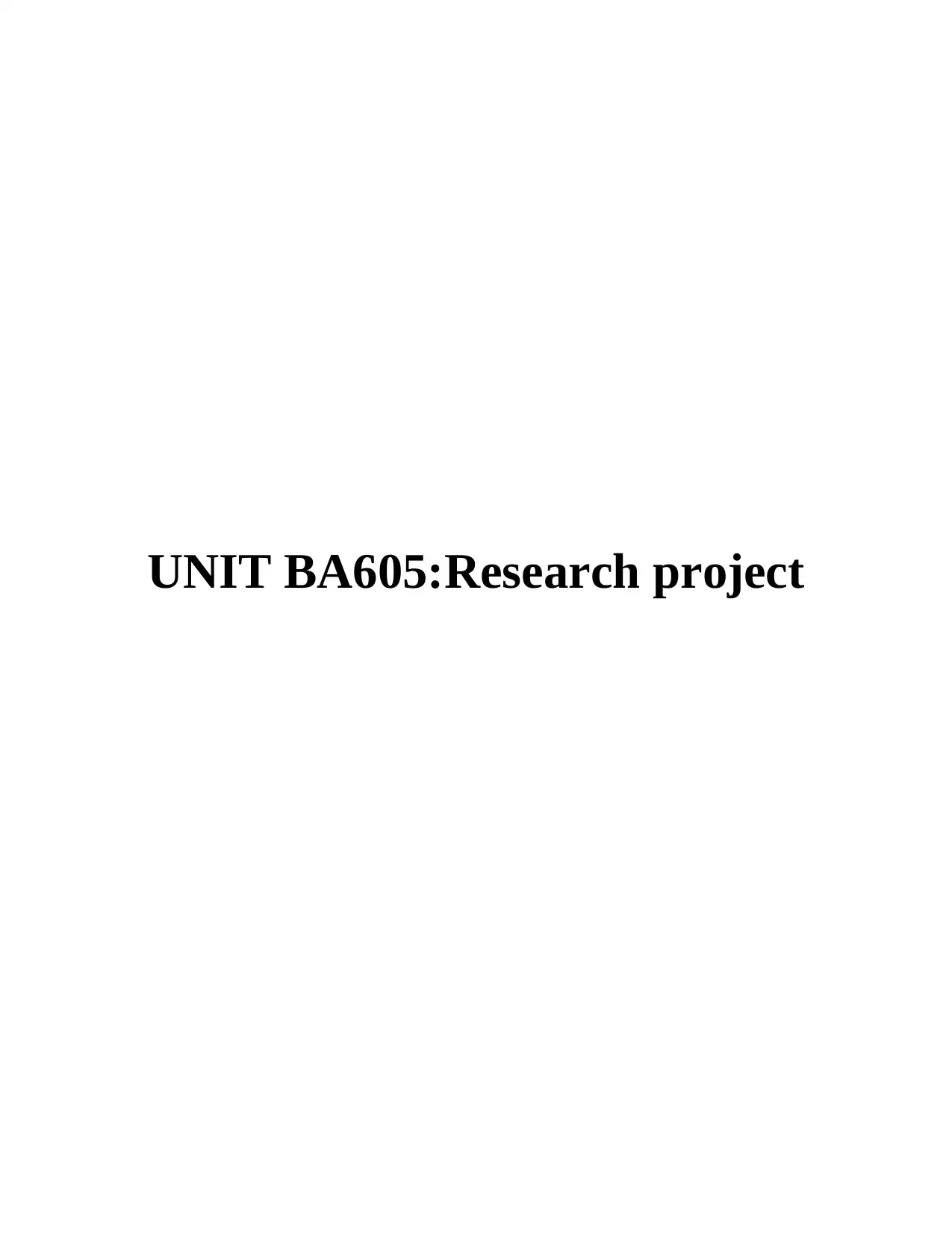
UNIT BA605:Research project
Paraphrase This Document
Need a fresh take? Get an instant paraphrase of this document with our AI Paraphraser
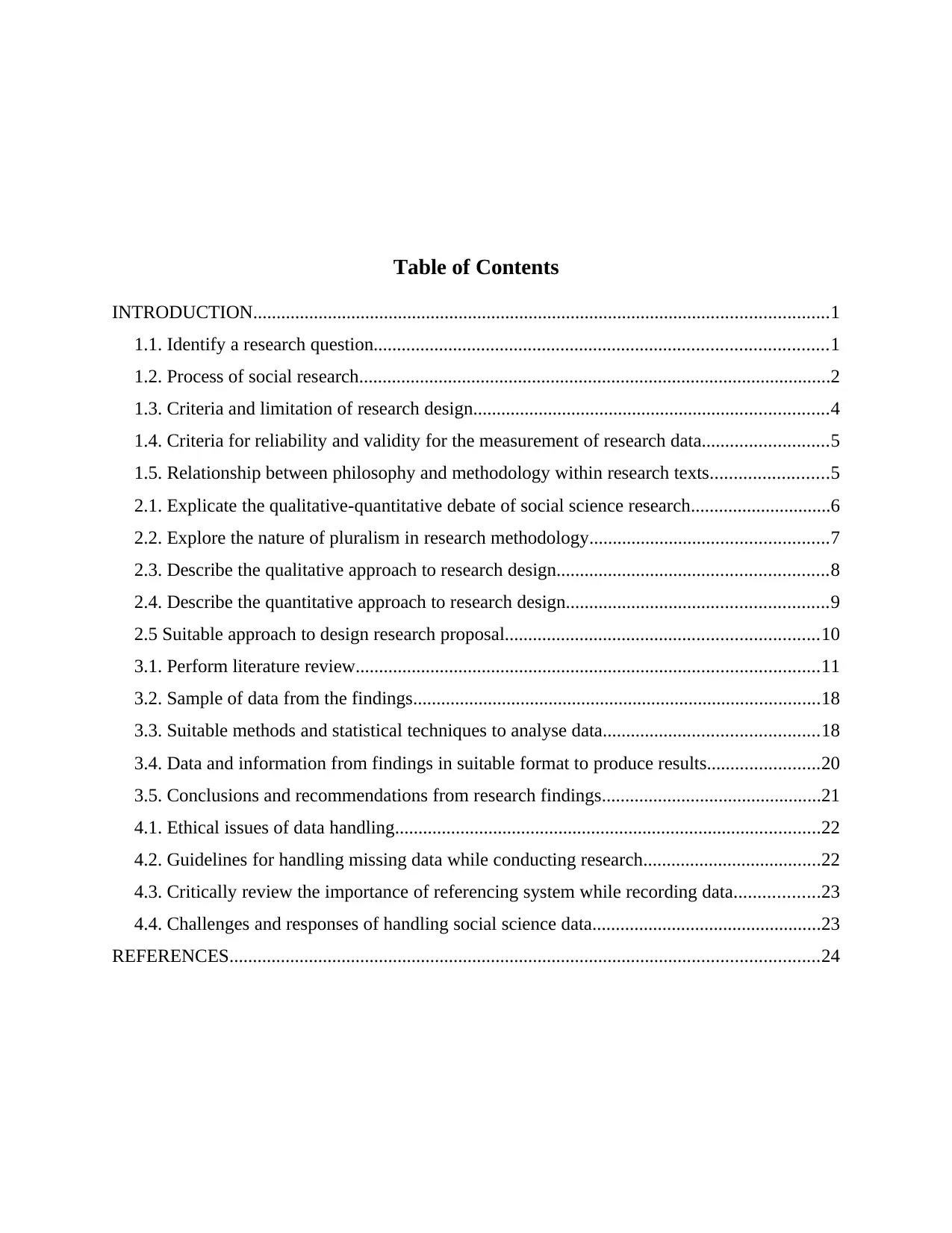
Table of Contents
INTRODUCTION...........................................................................................................................1
1.1. Identify a research question.................................................................................................1
1.2. Process of social research.....................................................................................................2
1.3. Criteria and limitation of research design............................................................................4
1.4. Criteria for reliability and validity for the measurement of research data...........................5
1.5. Relationship between philosophy and methodology within research texts.........................5
2.1. Explicate the qualitative-quantitative debate of social science research..............................6
2.2. Explore the nature of pluralism in research methodology...................................................7
2.3. Describe the qualitative approach to research design..........................................................8
2.4. Describe the quantitative approach to research design........................................................9
2.5 Suitable approach to design research proposal...................................................................10
3.1. Perform literature review...................................................................................................11
3.2. Sample of data from the findings.......................................................................................18
3.3. Suitable methods and statistical techniques to analyse data..............................................18
3.4. Data and information from findings in suitable format to produce results........................20
3.5. Conclusions and recommendations from research findings...............................................21
4.1. Ethical issues of data handling...........................................................................................22
4.2. Guidelines for handling missing data while conducting research......................................22
4.3. Critically review the importance of referencing system while recording data..................23
4.4. Challenges and responses of handling social science data.................................................23
REFERENCES..............................................................................................................................24
INTRODUCTION...........................................................................................................................1
1.1. Identify a research question.................................................................................................1
1.2. Process of social research.....................................................................................................2
1.3. Criteria and limitation of research design............................................................................4
1.4. Criteria for reliability and validity for the measurement of research data...........................5
1.5. Relationship between philosophy and methodology within research texts.........................5
2.1. Explicate the qualitative-quantitative debate of social science research..............................6
2.2. Explore the nature of pluralism in research methodology...................................................7
2.3. Describe the qualitative approach to research design..........................................................8
2.4. Describe the quantitative approach to research design........................................................9
2.5 Suitable approach to design research proposal...................................................................10
3.1. Perform literature review...................................................................................................11
3.2. Sample of data from the findings.......................................................................................18
3.3. Suitable methods and statistical techniques to analyse data..............................................18
3.4. Data and information from findings in suitable format to produce results........................20
3.5. Conclusions and recommendations from research findings...............................................21
4.1. Ethical issues of data handling...........................................................................................22
4.2. Guidelines for handling missing data while conducting research......................................22
4.3. Critically review the importance of referencing system while recording data..................23
4.4. Challenges and responses of handling social science data.................................................23
REFERENCES..............................................................................................................................24
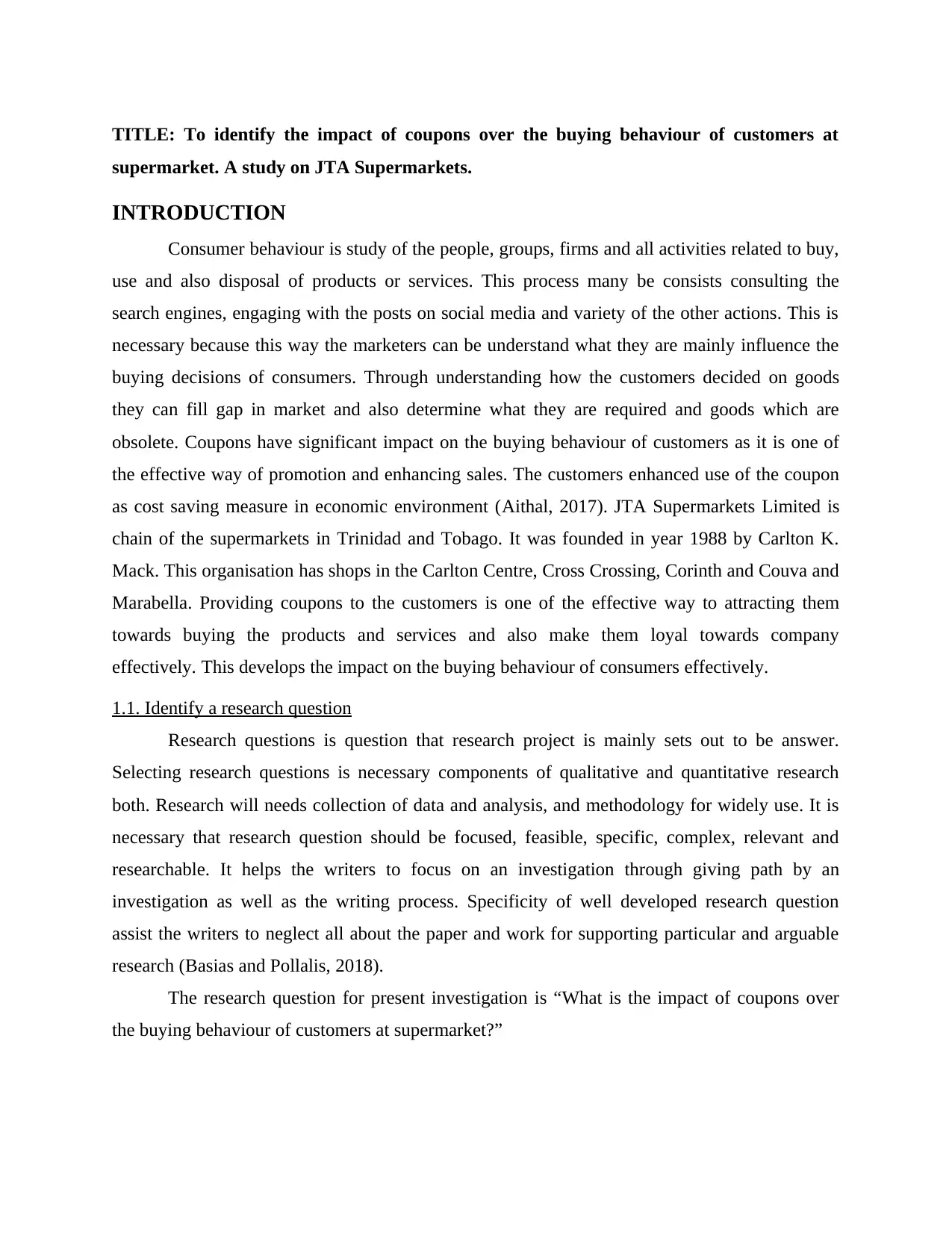
TITLE: To identify the impact of coupons over the buying behaviour of customers at
supermarket. A study on JTA Supermarkets.
INTRODUCTION
Consumer behaviour is study of the people, groups, firms and all activities related to buy,
use and also disposal of products or services. This process many be consists consulting the
search engines, engaging with the posts on social media and variety of the other actions. This is
necessary because this way the marketers can be understand what they are mainly influence the
buying decisions of consumers. Through understanding how the customers decided on goods
they can fill gap in market and also determine what they are required and goods which are
obsolete. Coupons have significant impact on the buying behaviour of customers as it is one of
the effective way of promotion and enhancing sales. The customers enhanced use of the coupon
as cost saving measure in economic environment (Aithal, 2017). JTA Supermarkets Limited is
chain of the supermarkets in Trinidad and Tobago. It was founded in year 1988 by Carlton K.
Mack. This organisation has shops in the Carlton Centre, Cross Crossing, Corinth and Couva and
Marabella. Providing coupons to the customers is one of the effective way to attracting them
towards buying the products and services and also make them loyal towards company
effectively. This develops the impact on the buying behaviour of consumers effectively.
1.1. Identify a research question
Research questions is question that research project is mainly sets out to be answer.
Selecting research questions is necessary components of qualitative and quantitative research
both. Research will needs collection of data and analysis, and methodology for widely use. It is
necessary that research question should be focused, feasible, specific, complex, relevant and
researchable. It helps the writers to focus on an investigation through giving path by an
investigation as well as the writing process. Specificity of well developed research question
assist the writers to neglect all about the paper and work for supporting particular and arguable
research (Basias and Pollalis, 2018).
The research question for present investigation is “What is the impact of coupons over
the buying behaviour of customers at supermarket?”
supermarket. A study on JTA Supermarkets.
INTRODUCTION
Consumer behaviour is study of the people, groups, firms and all activities related to buy,
use and also disposal of products or services. This process many be consists consulting the
search engines, engaging with the posts on social media and variety of the other actions. This is
necessary because this way the marketers can be understand what they are mainly influence the
buying decisions of consumers. Through understanding how the customers decided on goods
they can fill gap in market and also determine what they are required and goods which are
obsolete. Coupons have significant impact on the buying behaviour of customers as it is one of
the effective way of promotion and enhancing sales. The customers enhanced use of the coupon
as cost saving measure in economic environment (Aithal, 2017). JTA Supermarkets Limited is
chain of the supermarkets in Trinidad and Tobago. It was founded in year 1988 by Carlton K.
Mack. This organisation has shops in the Carlton Centre, Cross Crossing, Corinth and Couva and
Marabella. Providing coupons to the customers is one of the effective way to attracting them
towards buying the products and services and also make them loyal towards company
effectively. This develops the impact on the buying behaviour of consumers effectively.
1.1. Identify a research question
Research questions is question that research project is mainly sets out to be answer.
Selecting research questions is necessary components of qualitative and quantitative research
both. Research will needs collection of data and analysis, and methodology for widely use. It is
necessary that research question should be focused, feasible, specific, complex, relevant and
researchable. It helps the writers to focus on an investigation through giving path by an
investigation as well as the writing process. Specificity of well developed research question
assist the writers to neglect all about the paper and work for supporting particular and arguable
research (Basias and Pollalis, 2018).
The research question for present investigation is “What is the impact of coupons over
the buying behaviour of customers at supermarket?”
⊘ This is a preview!⊘
Do you want full access?
Subscribe today to unlock all pages.

Trusted by 1+ million students worldwide
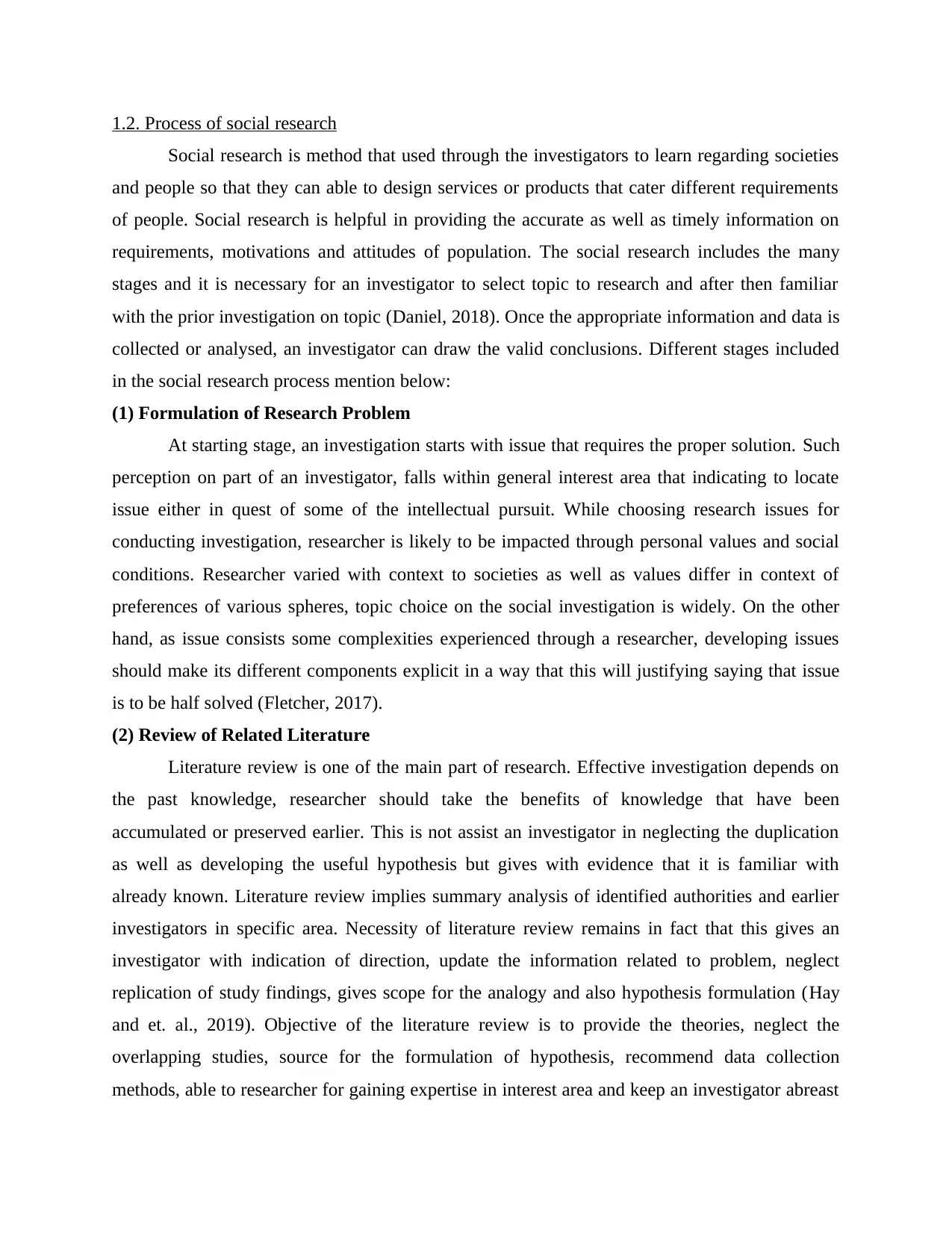
1.2. Process of social research
Social research is method that used through the investigators to learn regarding societies
and people so that they can able to design services or products that cater different requirements
of people. Social research is helpful in providing the accurate as well as timely information on
requirements, motivations and attitudes of population. The social research includes the many
stages and it is necessary for an investigator to select topic to research and after then familiar
with the prior investigation on topic (Daniel, 2018). Once the appropriate information and data is
collected or analysed, an investigator can draw the valid conclusions. Different stages included
in the social research process mention below:
(1) Formulation of Research Problem
At starting stage, an investigation starts with issue that requires the proper solution. Such
perception on part of an investigator, falls within general interest area that indicating to locate
issue either in quest of some of the intellectual pursuit. While choosing research issues for
conducting investigation, researcher is likely to be impacted through personal values and social
conditions. Researcher varied with context to societies as well as values differ in context of
preferences of various spheres, topic choice on the social investigation is widely. On the other
hand, as issue consists some complexities experienced through a researcher, developing issues
should make its different components explicit in a way that this will justifying saying that issue
is to be half solved (Fletcher, 2017).
(2) Review of Related Literature
Literature review is one of the main part of research. Effective investigation depends on
the past knowledge, researcher should take the benefits of knowledge that have been
accumulated or preserved earlier. This is not assist an investigator in neglecting the duplication
as well as developing the useful hypothesis but gives with evidence that it is familiar with
already known. Literature review implies summary analysis of identified authorities and earlier
investigators in specific area. Necessity of literature review remains in fact that this gives an
investigator with indication of direction, update the information related to problem, neglect
replication of study findings, gives scope for the analogy and also hypothesis formulation (Hay
and et. al., 2019). Objective of the literature review is to provide the theories, neglect the
overlapping studies, source for the formulation of hypothesis, recommend data collection
methods, able to researcher for gaining expertise in interest area and keep an investigator abreast
Social research is method that used through the investigators to learn regarding societies
and people so that they can able to design services or products that cater different requirements
of people. Social research is helpful in providing the accurate as well as timely information on
requirements, motivations and attitudes of population. The social research includes the many
stages and it is necessary for an investigator to select topic to research and after then familiar
with the prior investigation on topic (Daniel, 2018). Once the appropriate information and data is
collected or analysed, an investigator can draw the valid conclusions. Different stages included
in the social research process mention below:
(1) Formulation of Research Problem
At starting stage, an investigation starts with issue that requires the proper solution. Such
perception on part of an investigator, falls within general interest area that indicating to locate
issue either in quest of some of the intellectual pursuit. While choosing research issues for
conducting investigation, researcher is likely to be impacted through personal values and social
conditions. Researcher varied with context to societies as well as values differ in context of
preferences of various spheres, topic choice on the social investigation is widely. On the other
hand, as issue consists some complexities experienced through a researcher, developing issues
should make its different components explicit in a way that this will justifying saying that issue
is to be half solved (Fletcher, 2017).
(2) Review of Related Literature
Literature review is one of the main part of research. Effective investigation depends on
the past knowledge, researcher should take the benefits of knowledge that have been
accumulated or preserved earlier. This is not assist an investigator in neglecting the duplication
as well as developing the useful hypothesis but gives with evidence that it is familiar with
already known. Literature review implies summary analysis of identified authorities and earlier
investigators in specific area. Necessity of literature review remains in fact that this gives an
investigator with indication of direction, update the information related to problem, neglect
replication of study findings, gives scope for the analogy and also hypothesis formulation (Hay
and et. al., 2019). Objective of the literature review is to provide the theories, neglect the
overlapping studies, source for the formulation of hypothesis, recommend data collection
methods, able to researcher for gaining expertise in interest area and keep an investigator abreast
Paraphrase This Document
Need a fresh take? Get an instant paraphrase of this document with our AI Paraphraser
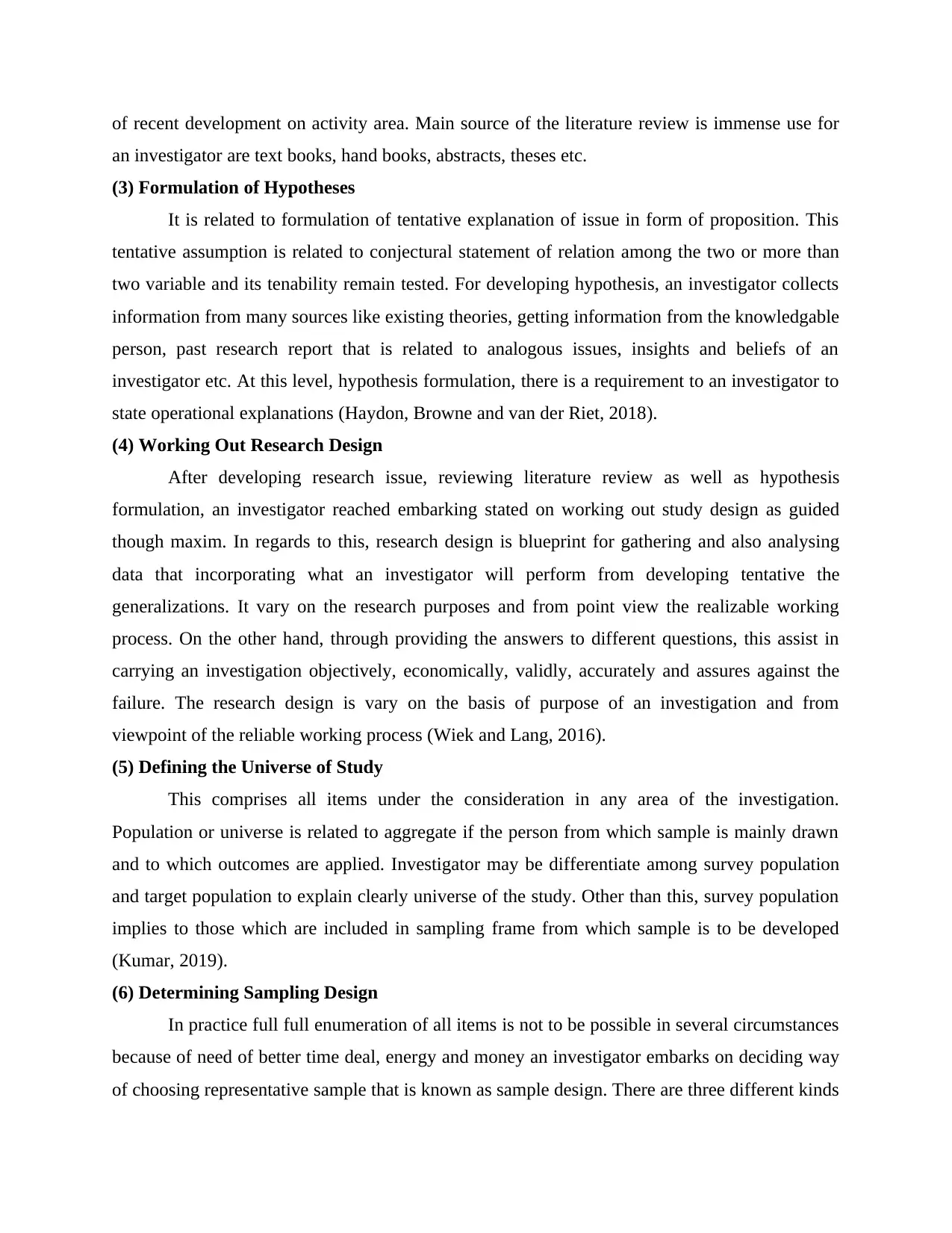
of recent development on activity area. Main source of the literature review is immense use for
an investigator are text books, hand books, abstracts, theses etc.
(3) Formulation of Hypotheses
It is related to formulation of tentative explanation of issue in form of proposition. This
tentative assumption is related to conjectural statement of relation among the two or more than
two variable and its tenability remain tested. For developing hypothesis, an investigator collects
information from many sources like existing theories, getting information from the knowledgable
person, past research report that is related to analogous issues, insights and beliefs of an
investigator etc. At this level, hypothesis formulation, there is a requirement to an investigator to
state operational explanations (Haydon, Browne and van der Riet, 2018).
(4) Working Out Research Design
After developing research issue, reviewing literature review as well as hypothesis
formulation, an investigator reached embarking stated on working out study design as guided
though maxim. In regards to this, research design is blueprint for gathering and also analysing
data that incorporating what an investigator will perform from developing tentative the
generalizations. It vary on the research purposes and from point view the realizable working
process. On the other hand, through providing the answers to different questions, this assist in
carrying an investigation objectively, economically, validly, accurately and assures against the
failure. The research design is vary on the basis of purpose of an investigation and from
viewpoint of the reliable working process (Wiek and Lang, 2016).
(5) Defining the Universe of Study
This comprises all items under the consideration in any area of the investigation.
Population or universe is related to aggregate if the person from which sample is mainly drawn
and to which outcomes are applied. Investigator may be differentiate among survey population
and target population to explain clearly universe of the study. Other than this, survey population
implies to those which are included in sampling frame from which sample is to be developed
(Kumar, 2019).
(6) Determining Sampling Design
In practice full full enumeration of all items is not to be possible in several circumstances
because of need of better time deal, energy and money an investigator embarks on deciding way
of choosing representative sample that is known as sample design. There are three different kinds
an investigator are text books, hand books, abstracts, theses etc.
(3) Formulation of Hypotheses
It is related to formulation of tentative explanation of issue in form of proposition. This
tentative assumption is related to conjectural statement of relation among the two or more than
two variable and its tenability remain tested. For developing hypothesis, an investigator collects
information from many sources like existing theories, getting information from the knowledgable
person, past research report that is related to analogous issues, insights and beliefs of an
investigator etc. At this level, hypothesis formulation, there is a requirement to an investigator to
state operational explanations (Haydon, Browne and van der Riet, 2018).
(4) Working Out Research Design
After developing research issue, reviewing literature review as well as hypothesis
formulation, an investigator reached embarking stated on working out study design as guided
though maxim. In regards to this, research design is blueprint for gathering and also analysing
data that incorporating what an investigator will perform from developing tentative the
generalizations. It vary on the research purposes and from point view the realizable working
process. On the other hand, through providing the answers to different questions, this assist in
carrying an investigation objectively, economically, validly, accurately and assures against the
failure. The research design is vary on the basis of purpose of an investigation and from
viewpoint of the reliable working process (Wiek and Lang, 2016).
(5) Defining the Universe of Study
This comprises all items under the consideration in any area of the investigation.
Population or universe is related to aggregate if the person from which sample is mainly drawn
and to which outcomes are applied. Investigator may be differentiate among survey population
and target population to explain clearly universe of the study. Other than this, survey population
implies to those which are included in sampling frame from which sample is to be developed
(Kumar, 2019).
(6) Determining Sampling Design
In practice full full enumeration of all items is not to be possible in several circumstances
because of need of better time deal, energy and money an investigator embarks on deciding way
of choosing representative sample that is known as sample design. There are three different kinds
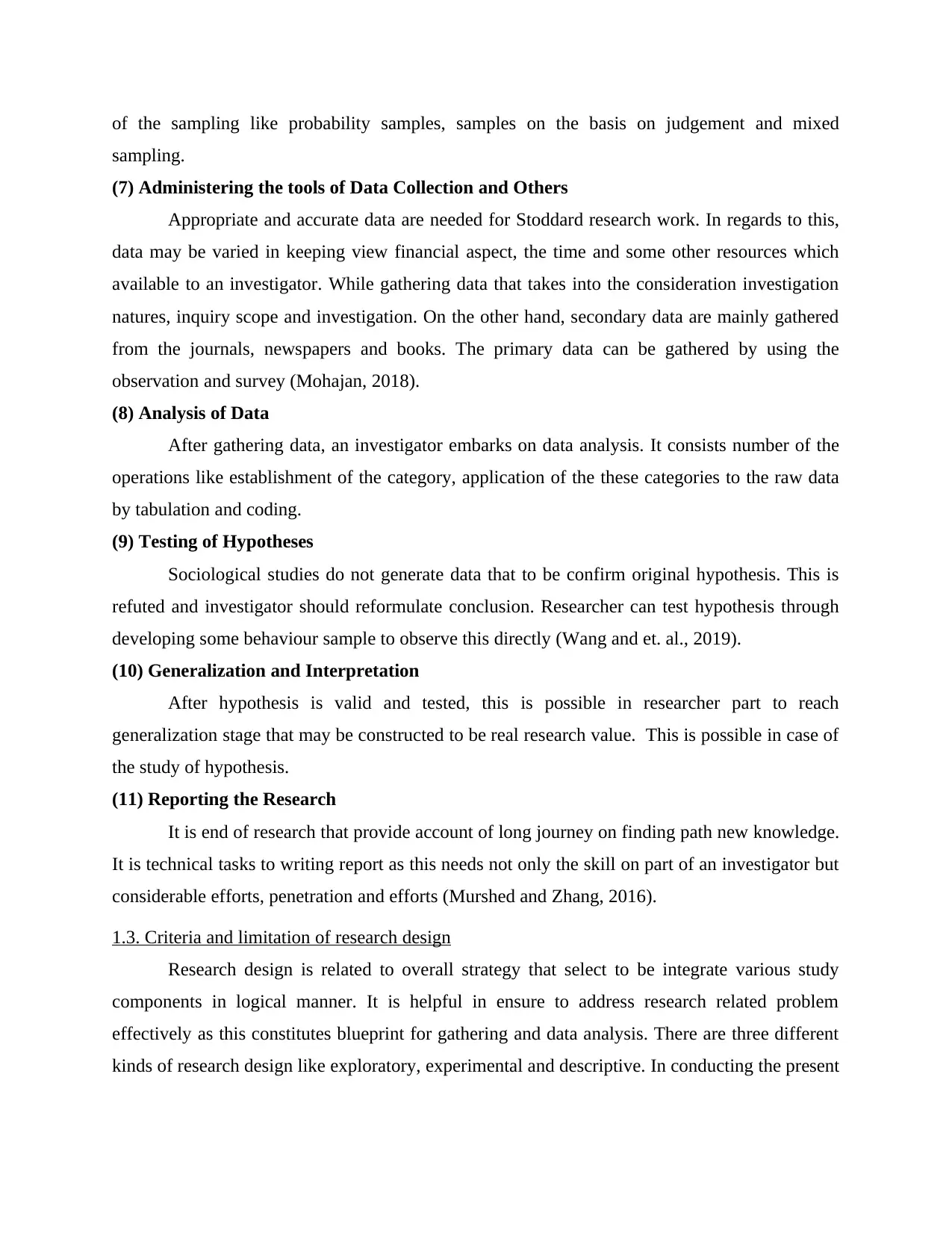
of the sampling like probability samples, samples on the basis on judgement and mixed
sampling.
(7) Administering the tools of Data Collection and Others
Appropriate and accurate data are needed for Stoddard research work. In regards to this,
data may be varied in keeping view financial aspect, the time and some other resources which
available to an investigator. While gathering data that takes into the consideration investigation
natures, inquiry scope and investigation. On the other hand, secondary data are mainly gathered
from the journals, newspapers and books. The primary data can be gathered by using the
observation and survey (Mohajan, 2018).
(8) Analysis of Data
After gathering data, an investigator embarks on data analysis. It consists number of the
operations like establishment of the category, application of the these categories to the raw data
by tabulation and coding.
(9) Testing of Hypotheses
Sociological studies do not generate data that to be confirm original hypothesis. This is
refuted and investigator should reformulate conclusion. Researcher can test hypothesis through
developing some behaviour sample to observe this directly (Wang and et. al., 2019).
(10) Generalization and Interpretation
After hypothesis is valid and tested, this is possible in researcher part to reach
generalization stage that may be constructed to be real research value. This is possible in case of
the study of hypothesis.
(11) Reporting the Research
It is end of research that provide account of long journey on finding path new knowledge.
It is technical tasks to writing report as this needs not only the skill on part of an investigator but
considerable efforts, penetration and efforts (Murshed and Zhang, 2016).
1.3. Criteria and limitation of research design
Research design is related to overall strategy that select to be integrate various study
components in logical manner. It is helpful in ensure to address research related problem
effectively as this constitutes blueprint for gathering and data analysis. There are three different
kinds of research design like exploratory, experimental and descriptive. In conducting the present
sampling.
(7) Administering the tools of Data Collection and Others
Appropriate and accurate data are needed for Stoddard research work. In regards to this,
data may be varied in keeping view financial aspect, the time and some other resources which
available to an investigator. While gathering data that takes into the consideration investigation
natures, inquiry scope and investigation. On the other hand, secondary data are mainly gathered
from the journals, newspapers and books. The primary data can be gathered by using the
observation and survey (Mohajan, 2018).
(8) Analysis of Data
After gathering data, an investigator embarks on data analysis. It consists number of the
operations like establishment of the category, application of the these categories to the raw data
by tabulation and coding.
(9) Testing of Hypotheses
Sociological studies do not generate data that to be confirm original hypothesis. This is
refuted and investigator should reformulate conclusion. Researcher can test hypothesis through
developing some behaviour sample to observe this directly (Wang and et. al., 2019).
(10) Generalization and Interpretation
After hypothesis is valid and tested, this is possible in researcher part to reach
generalization stage that may be constructed to be real research value. This is possible in case of
the study of hypothesis.
(11) Reporting the Research
It is end of research that provide account of long journey on finding path new knowledge.
It is technical tasks to writing report as this needs not only the skill on part of an investigator but
considerable efforts, penetration and efforts (Murshed and Zhang, 2016).
1.3. Criteria and limitation of research design
Research design is related to overall strategy that select to be integrate various study
components in logical manner. It is helpful in ensure to address research related problem
effectively as this constitutes blueprint for gathering and data analysis. There are three different
kinds of research design like exploratory, experimental and descriptive. In conducting the present
⊘ This is a preview!⊘
Do you want full access?
Subscribe today to unlock all pages.

Trusted by 1+ million students worldwide
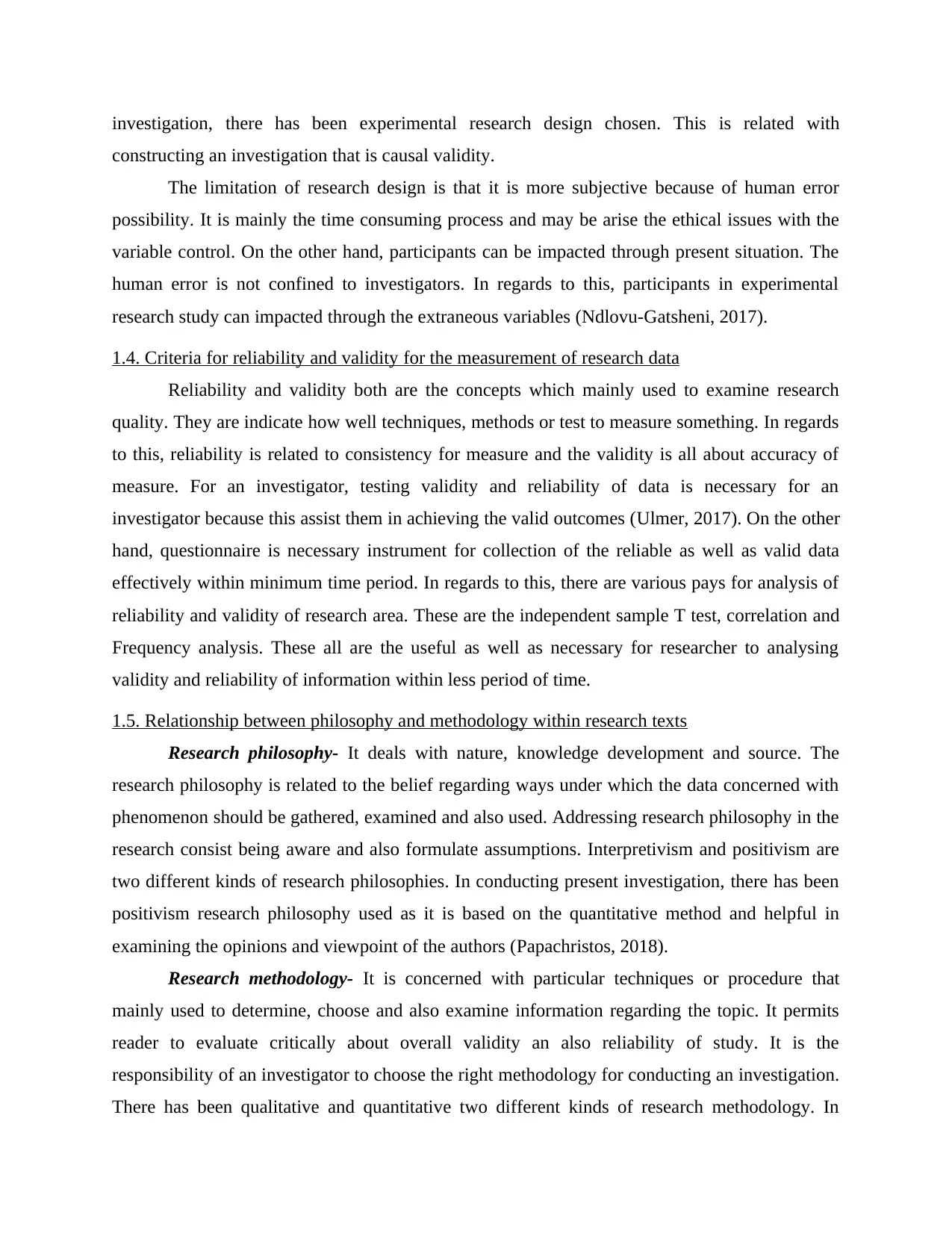
investigation, there has been experimental research design chosen. This is related with
constructing an investigation that is causal validity.
The limitation of research design is that it is more subjective because of human error
possibility. It is mainly the time consuming process and may be arise the ethical issues with the
variable control. On the other hand, participants can be impacted through present situation. The
human error is not confined to investigators. In regards to this, participants in experimental
research study can impacted through the extraneous variables (Ndlovu-Gatsheni, 2017).
1.4. Criteria for reliability and validity for the measurement of research data
Reliability and validity both are the concepts which mainly used to examine research
quality. They are indicate how well techniques, methods or test to measure something. In regards
to this, reliability is related to consistency for measure and the validity is all about accuracy of
measure. For an investigator, testing validity and reliability of data is necessary for an
investigator because this assist them in achieving the valid outcomes (Ulmer, 2017). On the other
hand, questionnaire is necessary instrument for collection of the reliable as well as valid data
effectively within minimum time period. In regards to this, there are various pays for analysis of
reliability and validity of research area. These are the independent sample T test, correlation and
Frequency analysis. These all are the useful as well as necessary for researcher to analysing
validity and reliability of information within less period of time.
1.5. Relationship between philosophy and methodology within research texts
Research philosophy- It deals with nature, knowledge development and source. The
research philosophy is related to the belief regarding ways under which the data concerned with
phenomenon should be gathered, examined and also used. Addressing research philosophy in the
research consist being aware and also formulate assumptions. Interpretivism and positivism are
two different kinds of research philosophies. In conducting present investigation, there has been
positivism research philosophy used as it is based on the quantitative method and helpful in
examining the opinions and viewpoint of the authors (Papachristos, 2018).
Research methodology- It is concerned with particular techniques or procedure that
mainly used to determine, choose and also examine information regarding the topic. It permits
reader to evaluate critically about overall validity an also reliability of study. It is the
responsibility of an investigator to choose the right methodology for conducting an investigation.
There has been qualitative and quantitative two different kinds of research methodology. In
constructing an investigation that is causal validity.
The limitation of research design is that it is more subjective because of human error
possibility. It is mainly the time consuming process and may be arise the ethical issues with the
variable control. On the other hand, participants can be impacted through present situation. The
human error is not confined to investigators. In regards to this, participants in experimental
research study can impacted through the extraneous variables (Ndlovu-Gatsheni, 2017).
1.4. Criteria for reliability and validity for the measurement of research data
Reliability and validity both are the concepts which mainly used to examine research
quality. They are indicate how well techniques, methods or test to measure something. In regards
to this, reliability is related to consistency for measure and the validity is all about accuracy of
measure. For an investigator, testing validity and reliability of data is necessary for an
investigator because this assist them in achieving the valid outcomes (Ulmer, 2017). On the other
hand, questionnaire is necessary instrument for collection of the reliable as well as valid data
effectively within minimum time period. In regards to this, there are various pays for analysis of
reliability and validity of research area. These are the independent sample T test, correlation and
Frequency analysis. These all are the useful as well as necessary for researcher to analysing
validity and reliability of information within less period of time.
1.5. Relationship between philosophy and methodology within research texts
Research philosophy- It deals with nature, knowledge development and source. The
research philosophy is related to the belief regarding ways under which the data concerned with
phenomenon should be gathered, examined and also used. Addressing research philosophy in the
research consist being aware and also formulate assumptions. Interpretivism and positivism are
two different kinds of research philosophies. In conducting present investigation, there has been
positivism research philosophy used as it is based on the quantitative method and helpful in
examining the opinions and viewpoint of the authors (Papachristos, 2018).
Research methodology- It is concerned with particular techniques or procedure that
mainly used to determine, choose and also examine information regarding the topic. It permits
reader to evaluate critically about overall validity an also reliability of study. It is the
responsibility of an investigator to choose the right methodology for conducting an investigation.
There has been qualitative and quantitative two different kinds of research methodology. In
Paraphrase This Document
Need a fresh take? Get an instant paraphrase of this document with our AI Paraphraser
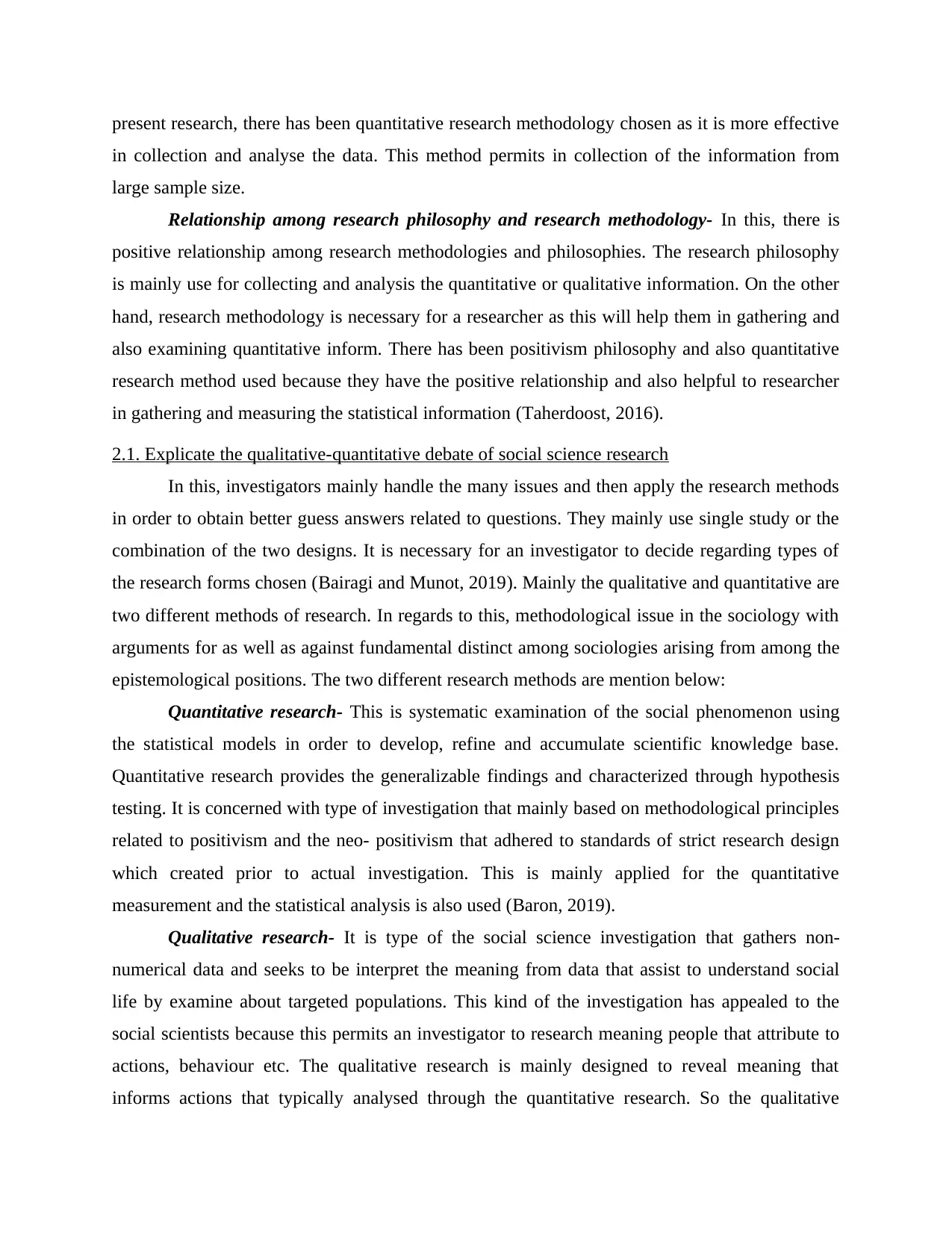
present research, there has been quantitative research methodology chosen as it is more effective
in collection and analyse the data. This method permits in collection of the information from
large sample size.
Relationship among research philosophy and research methodology- In this, there is
positive relationship among research methodologies and philosophies. The research philosophy
is mainly use for collecting and analysis the quantitative or qualitative information. On the other
hand, research methodology is necessary for a researcher as this will help them in gathering and
also examining quantitative inform. There has been positivism philosophy and also quantitative
research method used because they have the positive relationship and also helpful to researcher
in gathering and measuring the statistical information (Taherdoost, 2016).
2.1. Explicate the qualitative-quantitative debate of social science research
In this, investigators mainly handle the many issues and then apply the research methods
in order to obtain better guess answers related to questions. They mainly use single study or the
combination of the two designs. It is necessary for an investigator to decide regarding types of
the research forms chosen (Bairagi and Munot, 2019). Mainly the qualitative and quantitative are
two different methods of research. In regards to this, methodological issue in the sociology with
arguments for as well as against fundamental distinct among sociologies arising from among the
epistemological positions. The two different research methods are mention below:
Quantitative research- This is systematic examination of the social phenomenon using
the statistical models in order to develop, refine and accumulate scientific knowledge base.
Quantitative research provides the generalizable findings and characterized through hypothesis
testing. It is concerned with type of investigation that mainly based on methodological principles
related to positivism and the neo- positivism that adhered to standards of strict research design
which created prior to actual investigation. This is mainly applied for the quantitative
measurement and the statistical analysis is also used (Baron, 2019).
Qualitative research- It is type of the social science investigation that gathers non-
numerical data and seeks to be interpret the meaning from data that assist to understand social
life by examine about targeted populations. This kind of the investigation has appealed to the
social scientists because this permits an investigator to research meaning people that attribute to
actions, behaviour etc. The qualitative research is mainly designed to reveal meaning that
informs actions that typically analysed through the quantitative research. So the qualitative
in collection and analyse the data. This method permits in collection of the information from
large sample size.
Relationship among research philosophy and research methodology- In this, there is
positive relationship among research methodologies and philosophies. The research philosophy
is mainly use for collecting and analysis the quantitative or qualitative information. On the other
hand, research methodology is necessary for a researcher as this will help them in gathering and
also examining quantitative inform. There has been positivism philosophy and also quantitative
research method used because they have the positive relationship and also helpful to researcher
in gathering and measuring the statistical information (Taherdoost, 2016).
2.1. Explicate the qualitative-quantitative debate of social science research
In this, investigators mainly handle the many issues and then apply the research methods
in order to obtain better guess answers related to questions. They mainly use single study or the
combination of the two designs. It is necessary for an investigator to decide regarding types of
the research forms chosen (Bairagi and Munot, 2019). Mainly the qualitative and quantitative are
two different methods of research. In regards to this, methodological issue in the sociology with
arguments for as well as against fundamental distinct among sociologies arising from among the
epistemological positions. The two different research methods are mention below:
Quantitative research- This is systematic examination of the social phenomenon using
the statistical models in order to develop, refine and accumulate scientific knowledge base.
Quantitative research provides the generalizable findings and characterized through hypothesis
testing. It is concerned with type of investigation that mainly based on methodological principles
related to positivism and the neo- positivism that adhered to standards of strict research design
which created prior to actual investigation. This is mainly applied for the quantitative
measurement and the statistical analysis is also used (Baron, 2019).
Qualitative research- It is type of the social science investigation that gathers non-
numerical data and seeks to be interpret the meaning from data that assist to understand social
life by examine about targeted populations. This kind of the investigation has appealed to the
social scientists because this permits an investigator to research meaning people that attribute to
actions, behaviour etc. The qualitative research is mainly designed to reveal meaning that
informs actions that typically analysed through the quantitative research. So the qualitative
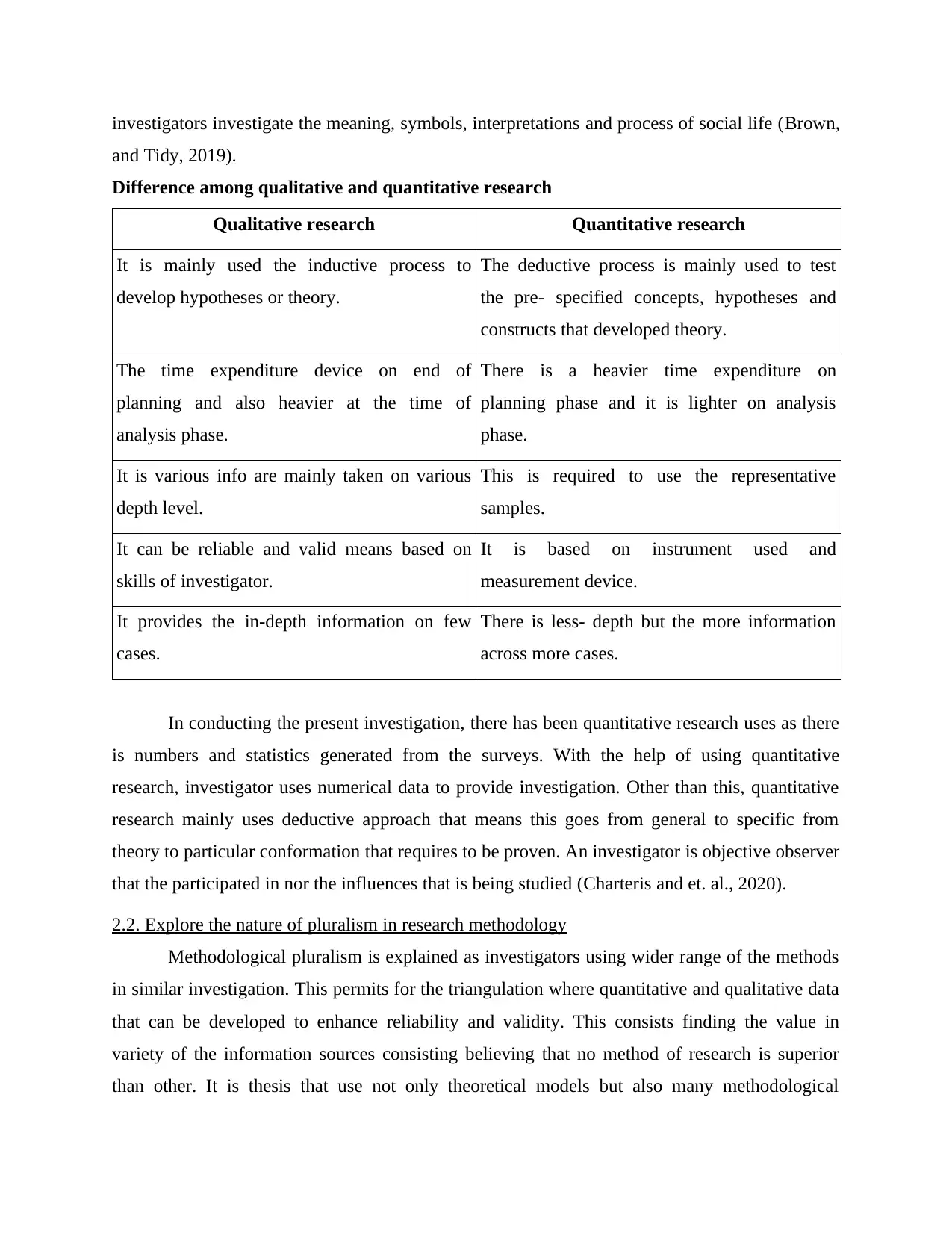
investigators investigate the meaning, symbols, interpretations and process of social life (Brown,
and Tidy, 2019).
Difference among qualitative and quantitative research
Qualitative research Quantitative research
It is mainly used the inductive process to
develop hypotheses or theory.
The deductive process is mainly used to test
the pre- specified concepts, hypotheses and
constructs that developed theory.
The time expenditure device on end of
planning and also heavier at the time of
analysis phase.
There is a heavier time expenditure on
planning phase and it is lighter on analysis
phase.
It is various info are mainly taken on various
depth level.
This is required to use the representative
samples.
It can be reliable and valid means based on
skills of investigator.
It is based on instrument used and
measurement device.
It provides the in-depth information on few
cases.
There is less- depth but the more information
across more cases.
In conducting the present investigation, there has been quantitative research uses as there
is numbers and statistics generated from the surveys. With the help of using quantitative
research, investigator uses numerical data to provide investigation. Other than this, quantitative
research mainly uses deductive approach that means this goes from general to specific from
theory to particular conformation that requires to be proven. An investigator is objective observer
that the participated in nor the influences that is being studied (Charteris and et. al., 2020).
2.2. Explore the nature of pluralism in research methodology
Methodological pluralism is explained as investigators using wider range of the methods
in similar investigation. This permits for the triangulation where quantitative and qualitative data
that can be developed to enhance reliability and validity. This consists finding the value in
variety of the information sources consisting believing that no method of research is superior
than other. It is thesis that use not only theoretical models but also many methodological
and Tidy, 2019).
Difference among qualitative and quantitative research
Qualitative research Quantitative research
It is mainly used the inductive process to
develop hypotheses or theory.
The deductive process is mainly used to test
the pre- specified concepts, hypotheses and
constructs that developed theory.
The time expenditure device on end of
planning and also heavier at the time of
analysis phase.
There is a heavier time expenditure on
planning phase and it is lighter on analysis
phase.
It is various info are mainly taken on various
depth level.
This is required to use the representative
samples.
It can be reliable and valid means based on
skills of investigator.
It is based on instrument used and
measurement device.
It provides the in-depth information on few
cases.
There is less- depth but the more information
across more cases.
In conducting the present investigation, there has been quantitative research uses as there
is numbers and statistics generated from the surveys. With the help of using quantitative
research, investigator uses numerical data to provide investigation. Other than this, quantitative
research mainly uses deductive approach that means this goes from general to specific from
theory to particular conformation that requires to be proven. An investigator is objective observer
that the participated in nor the influences that is being studied (Charteris and et. al., 2020).
2.2. Explore the nature of pluralism in research methodology
Methodological pluralism is explained as investigators using wider range of the methods
in similar investigation. This permits for the triangulation where quantitative and qualitative data
that can be developed to enhance reliability and validity. This consists finding the value in
variety of the information sources consisting believing that no method of research is superior
than other. It is thesis that use not only theoretical models but also many methodological
⊘ This is a preview!⊘
Do you want full access?
Subscribe today to unlock all pages.

Trusted by 1+ million students worldwide
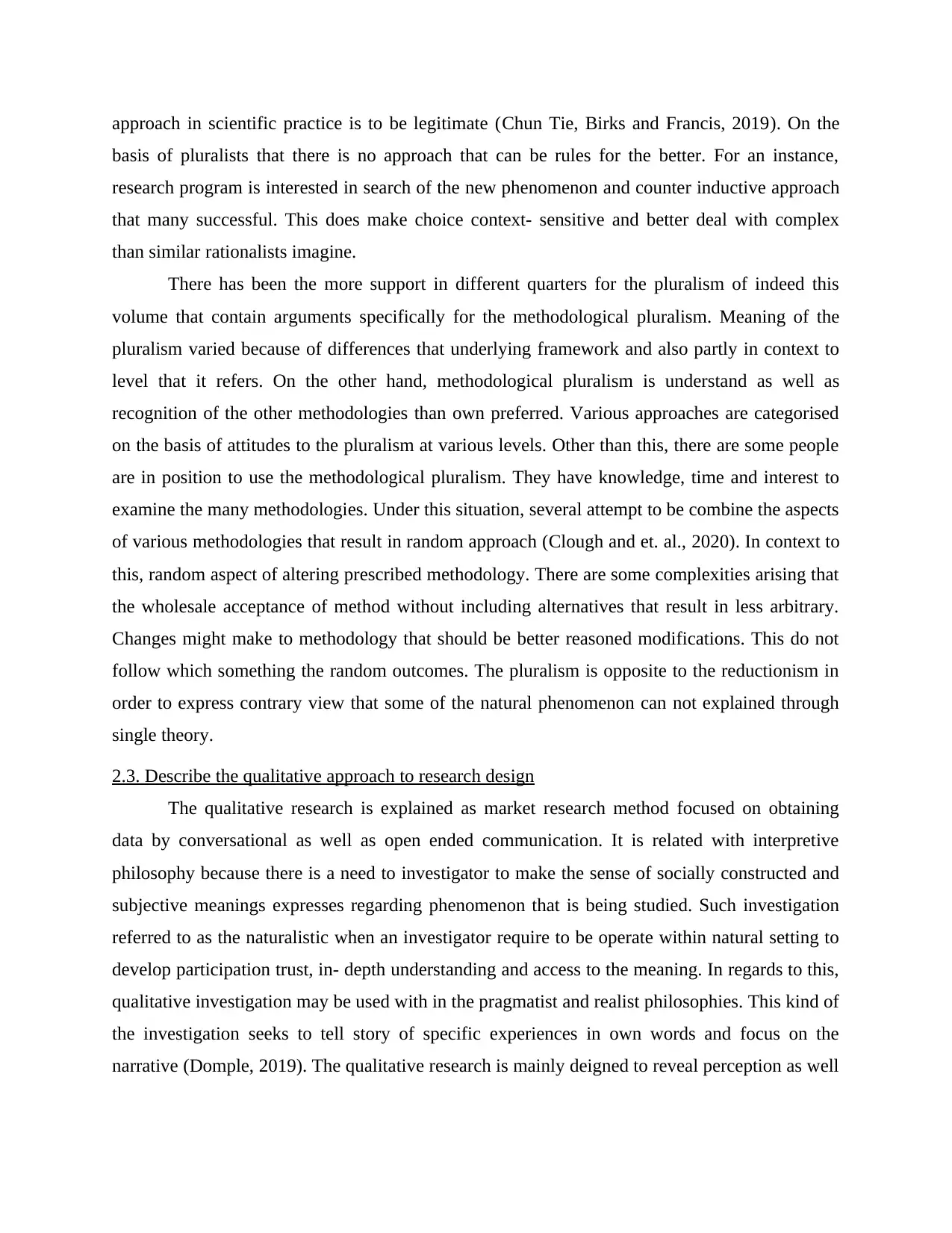
approach in scientific practice is to be legitimate (Chun Tie, Birks and Francis, 2019). On the
basis of pluralists that there is no approach that can be rules for the better. For an instance,
research program is interested in search of the new phenomenon and counter inductive approach
that many successful. This does make choice context- sensitive and better deal with complex
than similar rationalists imagine.
There has been the more support in different quarters for the pluralism of indeed this
volume that contain arguments specifically for the methodological pluralism. Meaning of the
pluralism varied because of differences that underlying framework and also partly in context to
level that it refers. On the other hand, methodological pluralism is understand as well as
recognition of the other methodologies than own preferred. Various approaches are categorised
on the basis of attitudes to the pluralism at various levels. Other than this, there are some people
are in position to use the methodological pluralism. They have knowledge, time and interest to
examine the many methodologies. Under this situation, several attempt to be combine the aspects
of various methodologies that result in random approach (Clough and et. al., 2020). In context to
this, random aspect of altering prescribed methodology. There are some complexities arising that
the wholesale acceptance of method without including alternatives that result in less arbitrary.
Changes might make to methodology that should be better reasoned modifications. This do not
follow which something the random outcomes. The pluralism is opposite to the reductionism in
order to express contrary view that some of the natural phenomenon can not explained through
single theory.
2.3. Describe the qualitative approach to research design
The qualitative research is explained as market research method focused on obtaining
data by conversational as well as open ended communication. It is related with interpretive
philosophy because there is a need to investigator to make the sense of socially constructed and
subjective meanings expresses regarding phenomenon that is being studied. Such investigation
referred to as the naturalistic when an investigator require to be operate within natural setting to
develop participation trust, in- depth understanding and access to the meaning. In regards to this,
qualitative investigation may be used with in the pragmatist and realist philosophies. This kind of
the investigation seeks to tell story of specific experiences in own words and focus on the
narrative (Domple, 2019). The qualitative research is mainly deigned to reveal perception as well
basis of pluralists that there is no approach that can be rules for the better. For an instance,
research program is interested in search of the new phenomenon and counter inductive approach
that many successful. This does make choice context- sensitive and better deal with complex
than similar rationalists imagine.
There has been the more support in different quarters for the pluralism of indeed this
volume that contain arguments specifically for the methodological pluralism. Meaning of the
pluralism varied because of differences that underlying framework and also partly in context to
level that it refers. On the other hand, methodological pluralism is understand as well as
recognition of the other methodologies than own preferred. Various approaches are categorised
on the basis of attitudes to the pluralism at various levels. Other than this, there are some people
are in position to use the methodological pluralism. They have knowledge, time and interest to
examine the many methodologies. Under this situation, several attempt to be combine the aspects
of various methodologies that result in random approach (Clough and et. al., 2020). In context to
this, random aspect of altering prescribed methodology. There are some complexities arising that
the wholesale acceptance of method without including alternatives that result in less arbitrary.
Changes might make to methodology that should be better reasoned modifications. This do not
follow which something the random outcomes. The pluralism is opposite to the reductionism in
order to express contrary view that some of the natural phenomenon can not explained through
single theory.
2.3. Describe the qualitative approach to research design
The qualitative research is explained as market research method focused on obtaining
data by conversational as well as open ended communication. It is related with interpretive
philosophy because there is a need to investigator to make the sense of socially constructed and
subjective meanings expresses regarding phenomenon that is being studied. Such investigation
referred to as the naturalistic when an investigator require to be operate within natural setting to
develop participation trust, in- depth understanding and access to the meaning. In regards to this,
qualitative investigation may be used with in the pragmatist and realist philosophies. This kind of
the investigation seeks to tell story of specific experiences in own words and focus on the
narrative (Domple, 2019). The qualitative research is mainly deigned to reveal perception as well
Paraphrase This Document
Need a fresh take? Get an instant paraphrase of this document with our AI Paraphraser
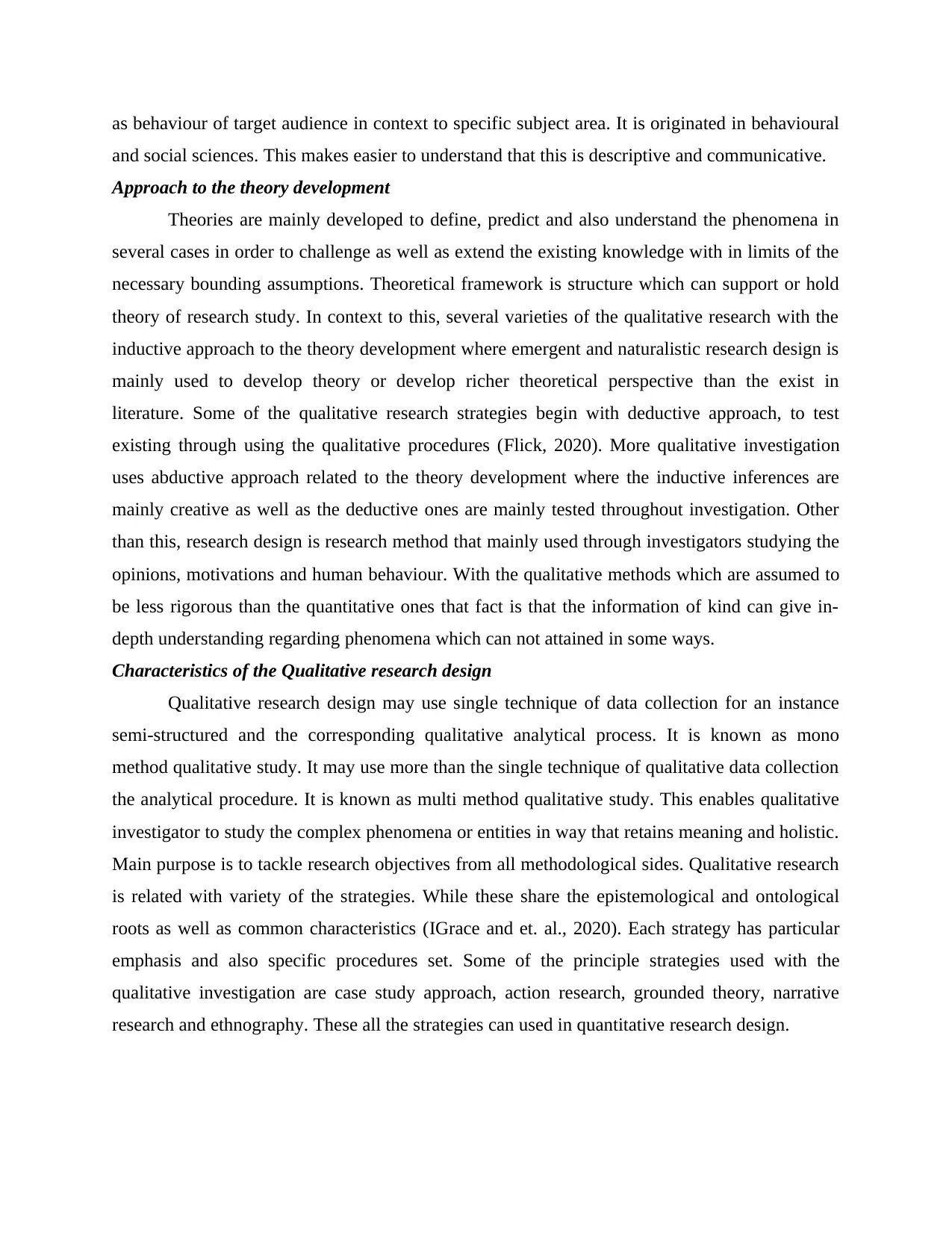
as behaviour of target audience in context to specific subject area. It is originated in behavioural
and social sciences. This makes easier to understand that this is descriptive and communicative.
Approach to the theory development
Theories are mainly developed to define, predict and also understand the phenomena in
several cases in order to challenge as well as extend the existing knowledge with in limits of the
necessary bounding assumptions. Theoretical framework is structure which can support or hold
theory of research study. In context to this, several varieties of the qualitative research with the
inductive approach to the theory development where emergent and naturalistic research design is
mainly used to develop theory or develop richer theoretical perspective than the exist in
literature. Some of the qualitative research strategies begin with deductive approach, to test
existing through using the qualitative procedures (Flick, 2020). More qualitative investigation
uses abductive approach related to the theory development where the inductive inferences are
mainly creative as well as the deductive ones are mainly tested throughout investigation. Other
than this, research design is research method that mainly used through investigators studying the
opinions, motivations and human behaviour. With the qualitative methods which are assumed to
be less rigorous than the quantitative ones that fact is that the information of kind can give in-
depth understanding regarding phenomena which can not attained in some ways.
Characteristics of the Qualitative research design
Qualitative research design may use single technique of data collection for an instance
semi-structured and the corresponding qualitative analytical process. It is known as mono
method qualitative study. It may use more than the single technique of qualitative data collection
the analytical procedure. It is known as multi method qualitative study. This enables qualitative
investigator to study the complex phenomena or entities in way that retains meaning and holistic.
Main purpose is to tackle research objectives from all methodological sides. Qualitative research
is related with variety of the strategies. While these share the epistemological and ontological
roots as well as common characteristics (IGrace and et. al., 2020). Each strategy has particular
emphasis and also specific procedures set. Some of the principle strategies used with the
qualitative investigation are case study approach, action research, grounded theory, narrative
research and ethnography. These all the strategies can used in quantitative research design.
and social sciences. This makes easier to understand that this is descriptive and communicative.
Approach to the theory development
Theories are mainly developed to define, predict and also understand the phenomena in
several cases in order to challenge as well as extend the existing knowledge with in limits of the
necessary bounding assumptions. Theoretical framework is structure which can support or hold
theory of research study. In context to this, several varieties of the qualitative research with the
inductive approach to the theory development where emergent and naturalistic research design is
mainly used to develop theory or develop richer theoretical perspective than the exist in
literature. Some of the qualitative research strategies begin with deductive approach, to test
existing through using the qualitative procedures (Flick, 2020). More qualitative investigation
uses abductive approach related to the theory development where the inductive inferences are
mainly creative as well as the deductive ones are mainly tested throughout investigation. Other
than this, research design is research method that mainly used through investigators studying the
opinions, motivations and human behaviour. With the qualitative methods which are assumed to
be less rigorous than the quantitative ones that fact is that the information of kind can give in-
depth understanding regarding phenomena which can not attained in some ways.
Characteristics of the Qualitative research design
Qualitative research design may use single technique of data collection for an instance
semi-structured and the corresponding qualitative analytical process. It is known as mono
method qualitative study. It may use more than the single technique of qualitative data collection
the analytical procedure. It is known as multi method qualitative study. This enables qualitative
investigator to study the complex phenomena or entities in way that retains meaning and holistic.
Main purpose is to tackle research objectives from all methodological sides. Qualitative research
is related with variety of the strategies. While these share the epistemological and ontological
roots as well as common characteristics (IGrace and et. al., 2020). Each strategy has particular
emphasis and also specific procedures set. Some of the principle strategies used with the
qualitative investigation are case study approach, action research, grounded theory, narrative
research and ethnography. These all the strategies can used in quantitative research design.
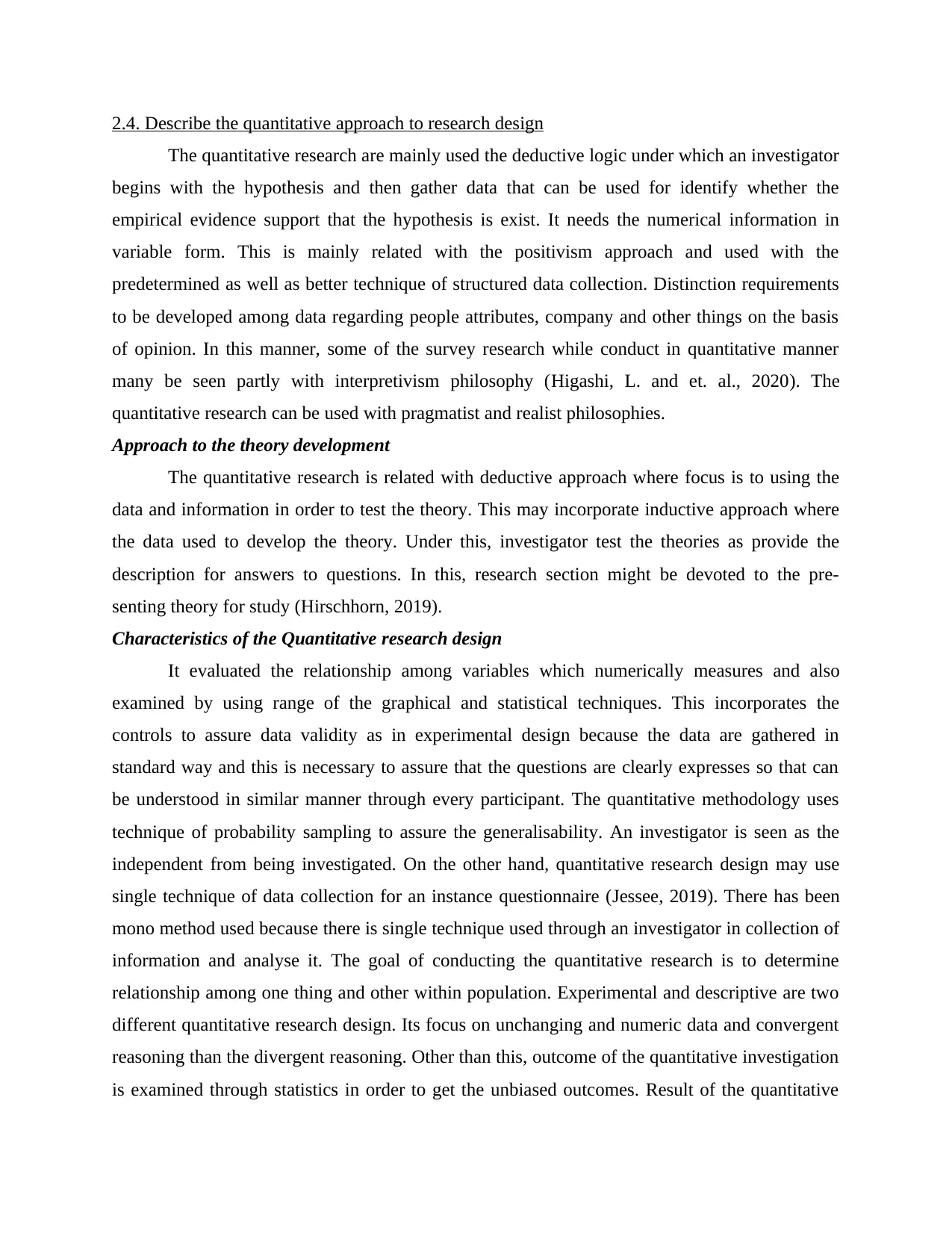
2.4. Describe the quantitative approach to research design
The quantitative research are mainly used the deductive logic under which an investigator
begins with the hypothesis and then gather data that can be used for identify whether the
empirical evidence support that the hypothesis is exist. It needs the numerical information in
variable form. This is mainly related with the positivism approach and used with the
predetermined as well as better technique of structured data collection. Distinction requirements
to be developed among data regarding people attributes, company and other things on the basis
of opinion. In this manner, some of the survey research while conduct in quantitative manner
many be seen partly with interpretivism philosophy (Higashi, L. and et. al., 2020). The
quantitative research can be used with pragmatist and realist philosophies.
Approach to the theory development
The quantitative research is related with deductive approach where focus is to using the
data and information in order to test the theory. This may incorporate inductive approach where
the data used to develop the theory. Under this, investigator test the theories as provide the
description for answers to questions. In this, research section might be devoted to the pre-
senting theory for study (Hirschhorn, 2019).
Characteristics of the Quantitative research design
It evaluated the relationship among variables which numerically measures and also
examined by using range of the graphical and statistical techniques. This incorporates the
controls to assure data validity as in experimental design because the data are gathered in
standard way and this is necessary to assure that the questions are clearly expresses so that can
be understood in similar manner through every participant. The quantitative methodology uses
technique of probability sampling to assure the generalisability. An investigator is seen as the
independent from being investigated. On the other hand, quantitative research design may use
single technique of data collection for an instance questionnaire (Jessee, 2019). There has been
mono method used because there is single technique used through an investigator in collection of
information and analyse it. The goal of conducting the quantitative research is to determine
relationship among one thing and other within population. Experimental and descriptive are two
different quantitative research design. Its focus on unchanging and numeric data and convergent
reasoning than the divergent reasoning. Other than this, outcome of the quantitative investigation
is examined through statistics in order to get the unbiased outcomes. Result of the quantitative
The quantitative research are mainly used the deductive logic under which an investigator
begins with the hypothesis and then gather data that can be used for identify whether the
empirical evidence support that the hypothesis is exist. It needs the numerical information in
variable form. This is mainly related with the positivism approach and used with the
predetermined as well as better technique of structured data collection. Distinction requirements
to be developed among data regarding people attributes, company and other things on the basis
of opinion. In this manner, some of the survey research while conduct in quantitative manner
many be seen partly with interpretivism philosophy (Higashi, L. and et. al., 2020). The
quantitative research can be used with pragmatist and realist philosophies.
Approach to the theory development
The quantitative research is related with deductive approach where focus is to using the
data and information in order to test the theory. This may incorporate inductive approach where
the data used to develop the theory. Under this, investigator test the theories as provide the
description for answers to questions. In this, research section might be devoted to the pre-
senting theory for study (Hirschhorn, 2019).
Characteristics of the Quantitative research design
It evaluated the relationship among variables which numerically measures and also
examined by using range of the graphical and statistical techniques. This incorporates the
controls to assure data validity as in experimental design because the data are gathered in
standard way and this is necessary to assure that the questions are clearly expresses so that can
be understood in similar manner through every participant. The quantitative methodology uses
technique of probability sampling to assure the generalisability. An investigator is seen as the
independent from being investigated. On the other hand, quantitative research design may use
single technique of data collection for an instance questionnaire (Jessee, 2019). There has been
mono method used because there is single technique used through an investigator in collection of
information and analyse it. The goal of conducting the quantitative research is to determine
relationship among one thing and other within population. Experimental and descriptive are two
different quantitative research design. Its focus on unchanging and numeric data and convergent
reasoning than the divergent reasoning. Other than this, outcome of the quantitative investigation
is examined through statistics in order to get the unbiased outcomes. Result of the quantitative
⊘ This is a preview!⊘
Do you want full access?
Subscribe today to unlock all pages.

Trusted by 1+ million students worldwide
1 out of 40
Related Documents
Your All-in-One AI-Powered Toolkit for Academic Success.
+13062052269
info@desklib.com
Available 24*7 on WhatsApp / Email
![[object Object]](/_next/static/media/star-bottom.7253800d.svg)
Unlock your academic potential
Copyright © 2020–2026 A2Z Services. All Rights Reserved. Developed and managed by ZUCOL.




